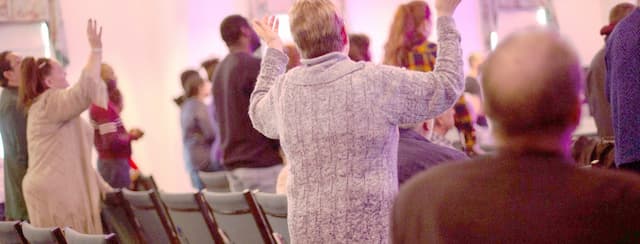The Prayer of Habakkuk
Habakkuk’s prayer (Habakkuk 3:1–19) comes after his dialogue with God in which the prophet expressed his concern about the evil and the violence occurring in Judah. His prayer reveals that Habakkuk understood what God was doing in dealing with the social upheaval in the nation. Although the prophet could not understand the full implication of God’s work in the world, his prayer reflects the triumph of faith of an individual who chose to trust in God in the face of adversity.
Introduction to Habakkuk’s Prayer, Habakkuk 3:1
“A prayer of the prophet Habakkuk according to Shigionoth” (Habakkuk 3:1).
Habakkuk is once again introduced as a prophet. This is the second time Habakkuk is introduced as a prophet. In the first superscription of the book, Habakkuk was introduced as a prophet and his message was introduced as “a burden.” Habakkuk’s burden was the pain he carried in his soul because of the violence and oppression some people were enduring in Judah.
In this second superscription of the book, Habakkuk is introduced as a man of prayer. Habakkuk’s prayer comes in the form of a song. This song has all the characteristics of the hymns sung in a cultic setting. Habakkuk’s prayer was sung to the tune called “Shigionoth.”
The word Shigionoth is the plural form of Shiggaion. Psalm 7 is titled “A Shiggaion of David.” The meaning of the word Shiggaion is unknown. It is possible that the word refers to a musical tune for hymns sung in the temple. The song has a notation: to “the director of music.” This indicates that this Shiggaion should be sung “with stringed instruments” (Habakkuk 3:19).
The word “Selah” which is used often in the book of Psalms, appears three times in Habakkuk’s prayer (Habakkuk 3:3, 9, 13). Although the etymology of the word is unknown, scholars believe that the word indicates a musical prelude in which the congregations stop singing while the string instruments continue to play.
Habakkuk’s Prayer, Habakkuk 3:2–7
Habakkuk begins his prayer with a petition to Yahweh to have mercy on his people as they prepare to face the Babylonian onslaught: “O LORD, I have heard of your renown, and I stand in awe, O LORD, of your work. In our own time revive it; in our own time make it known; in wrath may you remember mercy” (Habakkuk 3:2).
In his prayer, Habakkuk remembers the acts of God in the history of his people, “I have heard of your renown, and I stand in awe.” Many times in the past, God had acted to deliver Israel from their enemies. So great and majestic has been God’s work of salvation that Habakkuk was truly moved by what God had done, “I stand in awe of your work.”
Now, with the Babylonian threat looming on the horizon, Habakkuk asks God to do the same work of salvation, “In our own time revive it.” Habakkuk is aware that the Babylonians will be God’s agents of judgment, the “weapons of his wrath” (Jeremiah 50:25). Before the judgment comes, Habakkuk appeals to God’s mercy, “in wrath may you remember mercy.”
Habakkuk mentions the coming of Yahweh from Teman, a region located in the southern part of Edom. Job’s friend, Eliphaz, was a Temanite (Job 2:11). Habakkuk uses a unique name for God. He calls God ’elôah, “Eloah.” This name for God appears often in the book of Job.
The language with which Habakkuk describes the coming of God uses the same imagery that is present in the theophany in the Old Testament. A theophany is a manifestation of God to human beings. Habakkuk says that when God reveals himself, his glory covers the heavens, and the earth is full of his praise (Habakkuk 3:3).
In his coming Yahweh comes as a warrior ready for battle against the enemy. In the context of the book of Habakkuk, the enemy is Babylon. God brings pestilence and plague (Habakkuk 3:5). He shakes the earth and the nations tremble. This imagery describes the coming of the divine warrior to execute his judgment against the oppressors of his people.
Yahweh’s Victory Against Israel’s Enemy, Habakkuk 3:8–15
In reviewing God’s work of salvation, Habakkuk makes an indirect reference to the crossing of the sea in Exodus 15, possibly to the victory against the Canaanites in Judges 4, and the victory against the kings of Canaan in Joshua 10: “Was it in anger, LORD, that you struck the rivers and parted the sea? Were you displeased with them? No, you were sending your chariots of salvation . . . The sun and moon stood still in the sky as your brilliant arrows flew and your glittering spear flashed” (Habakkuk 3:8, 11 NLT).
Yahweh used the elements of nature, the work of his hands, to defeat the enemies of Israel: “You went out to rescue your chosen people, to save your anointed ones” (Habakkuk 3:13 NLT). After Habakkuk rehearses what Yahweh had done in the past to save Israel from the hands of its enemies (Habakkuk 3:13), the prophet introduces a musical interlude to his song, a Selah (Habakkuk 3:13), asking the congregation to pause while the stringed instrument continues to play.
With this interlude, the people singing this song will remember how Yahweh had expressed his commitment to the life of Israel by delivering the nation from the hands of its enemies. And now, as Israel prepares for an invasion from the Babylonians, the people will be assured that in the midst of the crisis the nation was facing, Yahweh will have mercy on the nation and allow a remnant to be preserved.
Habakkuk believes that Yahweh comes as a mighty warrior riding upon his horse to bring salvation to Judah. Yahweh’s intervention of behalf of his covenant people assures the prophet that although Babylon may inflict much harm and inflict much pain on the people of Judah, Babylon will eventually he held accountable for their violence and the sins against humanity, “on the day I settle accounts, I will hold them accountable for their sin” (Exodus 32:34 CSB).
Habakkuk knew that the Babylonian attack was imminent. The prophet also knew that when Jerusalem was besieged, there would be much anguish and suffering at the hands of the Babylonians. However, the calamity that would befall Judah would also become the fate of Babylon. Habakkuk said, “I wait quietly for the day of calamity to come upon the people who attack us” (Habakkuk 3:16).
Habakkuk’s Declaration of Trust, Habakkuk 3:16–19
Habakkuk ends his prayer with a declaration of trust and confidence in Yahweh. At the beginning of his dialogue with God, Habakkuk believed that Yahweh was indifferent to the violence and injustices that were rampant in Judah. He asked Yahweh, “Why do you tolerate wrong?” (Habakkuk 1:3 NIV).
In the midst of violence, injustice, strife, and conflict which were rampant in Judah, (Habakkuk 1:2–3), Habakkuk went to God in prayer, but he received no answer. Habakkuk complained, “O LORD, how long shall I cry for help, and you will not listen? (Habakkuk 1:2). The silence of God prompted Habakkuk to challenge the justice of Yahweh.
Yahweh appeared to Habakkuk in answer to his prayer and told the prophet that he was doing something about the violence and injustice in Judah. Yahweh told the prophet that he was bringing the Chaldeans as his agents to deal with violence in Judah.
Habakkuk was not happy with the way Yahweh was dealing with the social upheaval in Judah. His reason for his unhappiness was that the Babylonians were more brutal and more violent than the violent people in Judah. He told Yahweh: “Why do you say nothing when the wicked devour those more righteous than they are” (Habakkuk 1:13 NET).
In response to Habakkuk’s objection to how Yahweh was dealing with the problems in Judah, Yahweh told the prophet that in times of trouble, people who are weak in their faith, will surely fall. But those whose faith are strong, will remain faithful until the end.
Yahweh said to Habakkuk, “You see, anyone whose heart is not upright will succumb, but the upright will live through faithfulness” (Habakkuk 2:4 NJB). What Yahweh was saying to Habakkuk is that when people see evil and injustice in society, they blame God and they fall away from God because they believe that God is indifferent to violence and injustice.
On the other hand, the righteous will realize that God has a purpose for humanity. Although they cannot see the invisible hand of God, they know that God is at work fulfilling his purpose for his creation. Even though people may not understand God’s work in the world, they must remain faithful to God until the end, because the righteous person will not fall or be discouraged because of his faithfulness to God (Habakkuk 2:4).
When Habakkuk heard God’s declaration that he should be faithful when confronted with the mysteries of God, Habakkuk declared his faith and trust in Yahweh with the following words:
“Though the fig tree does not blossom, and no fruit is on the vines; though the produce of the olive fails, and the fields yield no food; though the flock is cut off from the fold, and there is no herd in the stalls, yet I will rejoice in the LORD; I will exult in the God of my salvation. GOD, the Lord, is my strength; he makes my feet like the feet of a deer, and makes me tread upon the heights” (Habakkuk 3:17–19).
In an agricultural society such as Israel, the fig tree, the fruit of the vine, the olives, and the produce of the fields were the most important products of the land and were considered the essential staples for human survival. Throughout the Old Testament, the fig tree, the fruit of the vine, and the olives were important items in the lives of the average Israelite.
The flock and the cattle were measures of a person’s wealth. In this passage, Habakkuk spoke of the worst possible consequences that could come upon the nation and upon the people as a result of a Babylonian invasion.
Faced with a possible complete failure of the crop and the loss of all that he considered to be his fortune, Habakkuk was determined to trust in God. Using contemporary language to express Habakkuk’s confidence in God, his words could be expressed as follows: “Even though I am hungry and even though I am broke, I will still trust in God.”
The reason for the prophet’s confidence was because he knew how the Lord would deliver him: “He makes my feet like the feet of a deer, and makes me tread upon the heights.”
The Hebrew word for deer refers to the doe or to the wild goat as a surefooted animal, able to climb mountains and dangerous heights without falling. This is the same confidence the author of Psalm 18 expressed in God. The psalmist rejoiced because he was sure that the Lord would deliver him from his enemies by making his feet like the feet of a deer: “He made my feet like the feet of a deer, and set me secure on the heights” (Psalm 18:33).
Conclusion
The book of Habakkuk deals with the problem of theodicy. As Nolgaski writes, “The themes of theodicy resound throughout Habakkuk as the prophet longs for justice, righteousness, and faithful living to be the hallmarks of society” (Nogalski 2011: 690).
In his dialogue with Yahweh, Habakkuk boldly expressed his anger at the violence and injustices that were prevalent in Judah. After Yahweh told him how he was dealing with the violence in Judah, Habakkuk changed his negative view of what God was doing by expressing his trust and confidence in Yahweh.
Yahweh’s use of the Babylonians to deal with the social problems of Judah surprised Habakkuk. But once Habakkuk recognized that Yahweh was also bringing judgment upon Babylon, the prophet changed his attitude. He stopped challenging God’s justice and realized that the divine judge was about to act in order to deal with the wickedness of his own people.
In his dialogue with Yahweh, Habakkuk learned an important lesson. The work of God in the world is beyond human understanding. Yahweh did not promise Habakkuk that the Babylonians would not conquer Jerusalem. But the prophet was assured that Yahweh would demand an account of the Babylonians for its violence and brutality in dealing with the people of Judah.
Even though the judgment for Babylon was in the future, maybe even after Habakkuk’s lifetime, the prophet was willing to put his trust in Yahweh and live a life of faithfulness.
Studies on the Book of Habakkuk
Introduction to the Book of Habakkuk
Habakkuk’s First Dialogue with God, Habakkuk 1:1–11
Habakkuk’s Second Dialogue with God, Habakkuk 1:12–2:4
The Five Woes of Habakkuk, Habakkuk 2:5–20
The Prayer of Habakkuk, Habakkuk 3:1–19
Claude Mariottini
Emeritus Professor of Old Testament
Northern Baptist Seminary
If you enjoyed reading this post, you will enjoy reading my books.
VISIT MY AMAZON AUTHOR’S PAGE
BUY MY BOOKS ON AMAZON (Click here).
NOTE: Did you like this post? Do you think other people would like to read this post? Be sure to share this post on Facebook and share a link on Twitter or Tumblr so that others may enjoy reading it too!
I would love to hear from you! Let me know what you thought of this post by leaving a comment below. Be sure to like my page on Facebook, follow me on Twitter, follow me on Tumblr, Facebook, and subscribe to my blog to receive each post by email.
If you are looking for other series of studies on the Old Testament, visit the Archive section and you will find many studies that deal with a variety of Old Testament topics.
BIBLIOGRAPHY
Nogalski, James D. The Book of the Twelve: Micah–Malachi. Smyth & Helwys Bible Commentary. Macon, GA: Smyth & Helwys, 2011.







